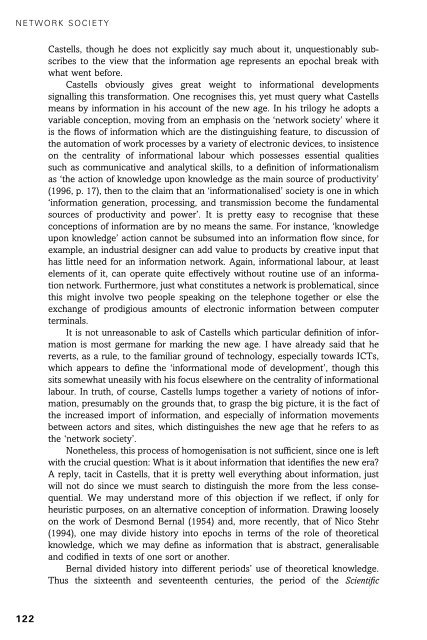Theories of the Information Society, Third Edition - Cryptome
Theories of the Information Society, Third Edition - Cryptome
Theories of the Information Society, Third Edition - Cryptome
Create successful ePaper yourself
Turn your PDF publications into a flip-book with our unique Google optimized e-Paper software.
NETWORK SOCIETY<br />
Castells, though he does not explicitly say much about it, unquestionably subscribes<br />
to <strong>the</strong> view that <strong>the</strong> information age represents an epochal break with<br />
what went before.<br />
Castells obviously gives great weight to informational developments<br />
signalling this transformation. One recognises this, yet must query what Castells<br />
means by information in his account <strong>of</strong> <strong>the</strong> new age. In his trilogy he adopts a<br />
variable conception, moving from an emphasis on <strong>the</strong> ‘network society’ where it<br />
is <strong>the</strong> flows <strong>of</strong> information which are <strong>the</strong> distinguishing feature, to discussion <strong>of</strong><br />
<strong>the</strong> automation <strong>of</strong> work processes by a variety <strong>of</strong> electronic devices, to insistence<br />
on <strong>the</strong> centrality <strong>of</strong> informational labour which possesses essential qualities<br />
such as communicative and analytical skills, to a definition <strong>of</strong> informationalism<br />
as ‘<strong>the</strong> action <strong>of</strong> knowledge upon knowledge as <strong>the</strong> main source <strong>of</strong> productivity’<br />
(1996, p. 17), <strong>the</strong>n to <strong>the</strong> claim that an ‘informationalised’ society is one in which<br />
‘information generation, processing, and transmission become <strong>the</strong> fundamental<br />
sources <strong>of</strong> productivity and power’. It is pretty easy to recognise that <strong>the</strong>se<br />
conceptions <strong>of</strong> information are by no means <strong>the</strong> same. For instance, ‘knowledge<br />
upon knowledge’ action cannot be subsumed into an information flow since, for<br />
example, an industrial designer can add value to products by creative input that<br />
has little need for an information network. Again, informational labour, at least<br />
elements <strong>of</strong> it, can operate quite effectively without routine use <strong>of</strong> an information<br />
network. Fur<strong>the</strong>rmore, just what constitutes a network is problematical, since<br />
this might involve two people speaking on <strong>the</strong> telephone toge<strong>the</strong>r or else <strong>the</strong><br />
exchange <strong>of</strong> prodigious amounts <strong>of</strong> electronic information between computer<br />
terminals.<br />
It is not unreasonable to ask <strong>of</strong> Castells which particular definition <strong>of</strong> information<br />
is most germane for marking <strong>the</strong> new age. I have already said that he<br />
reverts, as a rule, to <strong>the</strong> familiar ground <strong>of</strong> technology, especially towards ICTs,<br />
which appears to define <strong>the</strong> ‘informational mode <strong>of</strong> development’, though this<br />
sits somewhat uneasily with his focus elsewhere on <strong>the</strong> centrality <strong>of</strong> informational<br />
labour. In truth, <strong>of</strong> course, Castells lumps toge<strong>the</strong>r a variety <strong>of</strong> notions <strong>of</strong> information,<br />
presumably on <strong>the</strong> grounds that, to grasp <strong>the</strong> big picture, it is <strong>the</strong> fact <strong>of</strong><br />
<strong>the</strong> increased import <strong>of</strong> information, and especially <strong>of</strong> information movements<br />
between actors and sites, which distinguishes <strong>the</strong> new age that he refers to as<br />
<strong>the</strong> ‘network society’.<br />
None<strong>the</strong>less, this process <strong>of</strong> homogenisation is not sufficient, since one is left<br />
with <strong>the</strong> crucial question: What is it about information that identifies <strong>the</strong> new era?<br />
A reply, tacit in Castells, that it is pretty well everything about information, just<br />
will not do since we must search to distinguish <strong>the</strong> more from <strong>the</strong> less consequential.<br />
We may understand more <strong>of</strong> this objection if we reflect, if only for<br />
heuristic purposes, on an alternative conception <strong>of</strong> information. Drawing loosely<br />
on <strong>the</strong> work <strong>of</strong> Desmond Bernal (1954) and, more recently, that <strong>of</strong> Nico Stehr<br />
(1994), one may divide history into epochs in terms <strong>of</strong> <strong>the</strong> role <strong>of</strong> <strong>the</strong>oretical<br />
knowledge, which we may define as information that is abstract, generalisable<br />
and codified in texts <strong>of</strong> one sort or ano<strong>the</strong>r.<br />
Bernal divided history into different periods’ use <strong>of</strong> <strong>the</strong>oretical knowledge.<br />
Thus <strong>the</strong> sixteenth and seventeenth centuries, <strong>the</strong> period <strong>of</strong> <strong>the</strong> Scientific<br />
122
















